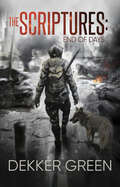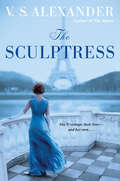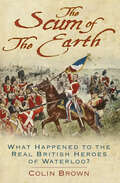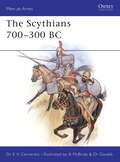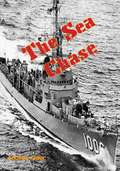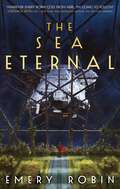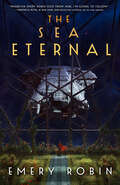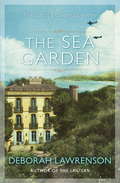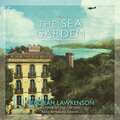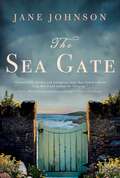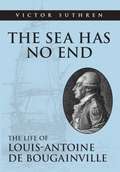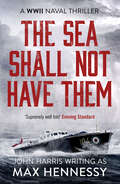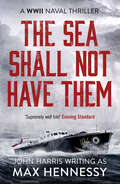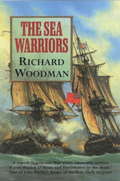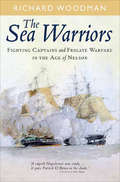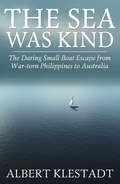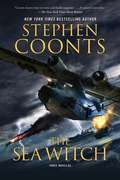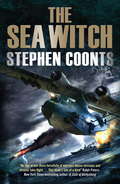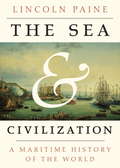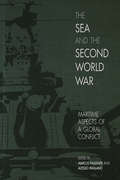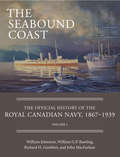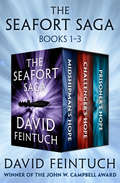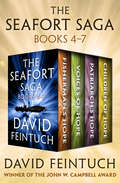- Table View
- List View
The Scriptures: End of Days (The Scriptures #1)
by Dekker GreenFOR FANS OF LEFT BEHIND -The Scriptures is a thrilling debut about the end of the world following a nuclear attack on New York. It is the end of days. A nuclear strike hits New York. Alfie, a young black male, survives but with no memory of what has happened. The only thing he can remember with any clarity is how to play his guitar and a few snatches of old blues and folk songs.Another survivor, Meg, has taken refuge in the hills of Vermont, and she, too, is the victim of near absolute amnesia. Her only hope is to survive these darkest of days. Across the country, a prophet called John is reveling in the fallout of chaos that accompanies the strike and is calling for Judgment Day against sinners, all while civilization burns around him. This is the final battle. Alfie and Meg don't know it, but they have a grim destiny. They must stand together and defeat the Great Beast with only their faith to shield them. Can they build a New Jerusalem from the ruins of the White House?
The Sculptress
by V.S. AlexanderFrom acclaimed author V.S. Alexander comes an absorbing, immersive novel set during World War I, as a talented and ambitious artist finds an unusual calling. May 1917: The elegant streets of Boston are thousands of miles away from the carnage of the Western Front. Yet even here, amid the clatter of horse-drawn carriages and automobiles, it is impossible to ignore the war raging across Europe. Emma Lewis Swan&’s husband, Tom, has gone to France, eager to do his duty as a surgeon. Emma, a sculptress, has stayed behind, pursuing her art despite being dismissed by male critics. On the bustling sidewalk she spies a returned soldier. His brutally scarred face inspires first pity, and then something more—a determination to use her skill to make masks for disfigured soldiers. Leaving Boston for France also means leaving behind Linton Bower, a fiery, gifted artist determined to win her. Emma&’s union with Tom has been steady yet passionless, marred by guilt over a choice she made long ago. In Paris, she crafts intricate, lifelike masks to restore these wounded men to the world. But in the course of her new career she will encounter one man who compels her to confront the secret she&’s never revealed, not even to Tom. Only by casting off the façade she has worn for so long can she pursue a path through heartbreak and turmoil toward her own unexpected future. . . . Praise for V.S. Alexander&’s The Traitor &“Alexander brings his signature commitment to historical accuracy to The Traitor, immersing readers in the intrigue of the resistance. Fans of Anthony Doerr's All the Light We Cannot See and Alex Rosenberg's The Girl from Krakow will fall under the spell of this powerfully moving novel.&”—Booklist
The Scum of the Earth: What Happened to the Real British Heroes of Waterloo?
by Colin BrownThe Scum of the Earth follows the men Wellington called just that from victory at Waterloo to a Regency Britain at war with itself, and explodes some of the myths on the way; such as that the defeat of Napoleon ended the threat of revolution spreading from France. Did the victorious soldiers return to a land fit for heroes? They did not. There was the first of the Corn Laws in the same year as the battle, there was famine and chronic unemployment. In 1819, the Peterloo massacre saw 15 killed and at least 500 injured when cavalry sabred a crowd demanding parliamentary reform. Peace in Europe perhaps for 50 years – but at home, repression and revolution in the air. And at the same time, the sheer exuberance of the Regency period, with new buildings, new art, even 17 new colonies more or less accidentally acquired. By 1848 the whole of Europe was once more set for complete upheaval. There is no one better to take a cold, hard look at the battle itself and its aftermath, in order to save us from an anniversary of misty-eyed backslapping, than political editor Colin Brown.
The Scythians 700-300 BC
by Angus Mcbride E. V. CernenkoThough the 'Scythian period' in the history of Eastern Europe lasted little more than 400 years, the impression these horsemen made upon the history of their times was such that a thousand years after they had ceased to exist as a sovereign people, their heartland and the territories which they dominated far beyond it continued to be known as 'greater Scythia'. From the very beginnings of their emergence on the world scene the Scythians took part in the greatest campaigns of their times, defeating such mighty contemporaries as Assyria, Urartu, Babylonia, Media and Persia. This highly illustrated book details their costume, weapons and the way they waged war.
The Sea Chase
by Andrew GeerThe German freighter Ergenstrasse is lying in Sydney harbour when war breaks out. Her master, Karl Ehrlich, has two options. To scuttle his battered old vessel, or to pit his skill and her rusty eight thousand tons against the British naval blockade—and run for home.For Ehrlich there is no choice, and the Ergenstrasse begins her impossible voyage. Across the Pacific to Norway, via Chile, Cape Horn and Greenland.Ehrlich’s indomitable spirit and brilliant seamanship are nearly a match for the tremendous odds against him. But he has not reckoned on the enemy within...“One long thrill...the clash of character is convincing and the variety of incident remarkable. A grand story.”—Sir Compton Mackenzie“A tough, exciting adventure story.”—Observer
The Sea Eternal
by Emery Robin'Wherever Emery Robin goes from here, I'm going to follow' Veronica Roth, #1 New York Times bestselling authorFrom one of the most original voices in science fiction comes the spectacular sequel to the epic, interstellar love story that began in The Stars Undying. Goddess, tell me the story. Matheus Ceirran, commander of half the known world, is dead. For the past year, his loyal captain Anita has hunted down his assassins-that is, when she can pull herself from the bed of Altagracia Caviro Patramata, queen and oracle of the client planet of Szayet. But when Anita's quest for revenge takes her across the borders of an enigmatic neighboring empire, she uncovers a dangerous secret that could upend the fragile balance of the galaxy. Meanwhile, Ceirran's heir apparent Otávio Julhan grows more and more powerful in the capital that Anita has left behind. Caught between home, Szayet, and a new and greater threat, Anita finds herself at the center of a war that threatens to collapse her world.The fate of empires dances on the tip of a knife, and history will be written by the victors in this sweeping tale of myth, imperial legacy, and the love affair of a lifetime.Praise for this duology: 'Dazzling, transportive, boundless, precise-and dares to ask, what if Mark Antony was the hottest butch girl in space?' Casey McQuiston'Gorgeously written, impeccably characterized, and profoundly aware of the way the ghosts of history linger' Emily Tesh 'A glittering triumph of a book that weaves together history and tragedy into a star-spanning epic' Everina Maxwell
The Sea Eternal (Empire Without End #2)
by Emery Robin"Wherever Emery Robin goes from here, I'm going to follow." —Veronica Roth, #1 New York Times bestselling authorFrom one of the most original voices in science fiction comes the spectacular sequel to the epic, interstellar love story that began in The Stars Undying. Goddess, tell me the story. Matheus Ceirran, commander of half the known world, is dead. For the past year, his loyal captain Anita has hunted down his assassins—that is, when she can pull herself from the bed of Altagracia Caviro Patramata, queen and oracle of the client planet of Szayet. But when Anita&’s quest for revenge takes her across the borders of an enigmatic neighboring empire, she uncovers a dangerous secret that could upend the fragile balance of the galaxy. Meanwhile, Ceirran&’s heir apparent Otávio Julhan grows more and more powerful in the capital that Anita has left behind. Caught between home, Szayet, and a new and greater threat, Anita finds herself at the center of a war that threatens to collapse her world. The fate of empires dances on the tip of a knife, and history will be written by the victors in this sweeping tale of myth, imperial legacy, and the love affair of a lifetime.Praise for the Empire Without End: "Dazzling, transportive, boundless, precise—and dares to ask, what if Mark Antony was the hottest butch girl in space?" —Casey McQuiston "Gorgeously written, impeccably characterized, and profoundly aware of the way the ghosts of history linger." —Emily Tesh "A glittering triumph of a book that weaves together history and tragedy into a star-spanning epic." —Everina Maxwell
The Sea Garden: Escape to France in the perfect gripping historical novel this year
by Deborah LawrensonFollowing on from her TV Book Club success with THE LANTERN, bestselling author Deborah Lawrenson returns to the south of France with another captivating story of wartime love, secrets and bravery.Present day. On a lush Mediterranean island off the French coast, Ellie has accepted a commission to restore an abandoned garden. It seems idyllic, but the longer Ellie spends at the house and garden, the more she senses darkness, and a lingering evil that seems to haunt her.Second World War. Two very different women have their lives irrevocably changed: Iris, a junior intelligence officer in London and Marthe, a blind girl who works in the lavender fields of Provence and is slowly drawn into the heart of the Resistance. As secret messages are passed in scent and planes land by moonlight, danger comes ever closer...Perfect for fans of Tracy Rees, Rachel Hore and Rachel Rhys, this gripping historical will have you gripped from the first page.
The Sea Garden: Escape to France in the perfect gripping historical novel this year
by Deborah LawrensonPresent day. On a lush Mediterranean island off the French coast, Ellie has accepted a commission to restore an abandoned garden. It seems idyllic, but the longer Ellie spends at the house and garden, the more she senses darkness, and a lingering evil that seems to haunt her.Second World War. Two very different women have their lives irrevocably changed: Iris, a junior intelligence officer in London and Marthe, a blind girl who works in the lavender fields of Provence and is slowly drawn into the heart of the Resistance. As secret messages are passed in scent and planes land by moonlight, danger comes ever closer...Read by Helen Cashin(p) 2014 Orion Publishing Group
The Sea Gate
by Jane JohnsonA broken family, a house of secrets—an entrancing tale of love and courage set during the Second World War.After Rebecca&’s mother dies, she must sort through her empty flat and come to terms with her loss. As she goes through her mother&’s mail, she finds a handwritten envelope. In it is a letter that will change her life forever. Olivia, her mother&’s elderly cousin, needs help to save her beloved home. Rebecca immediately goes to visit Olivia in Cornwall only to find a house full of secrets—treasures in the attic and a mysterious tunnel leading from the cellar to the sea, and Olivia, nowhere to be found. As it turns out, the old woman is stuck in hospital with no hope of being discharged until her house is made habitable again. Rebecca sets to work restoring the home to its former glory, but as she peels back the layers of paint and grime, she uncovers even more buried secrets—secrets from a time when the Second World War was raging, when Olivia was a young woman, and when both romance and danger lurked around every corner... A sweeping and utterly spellbinding tale of a young woman&’s courage in the face of war and the lengths to which she&’ll go to protect those she loves against the most unexpected of enemies.
The Sea Has No End: The Life of Louis-Antoine de Bougainville
by Victor SuthrenShort-listedfor the 2005 Ottawa Book Award for Non-fiction Soldier, sailor, adventurer, and philosopher, Louis-Antoine de Bougainville was a talented French officer whose remarkable career took him from the boudoirs of Paris to the flintlock battlefields of North America and on to the luch islands of the South Pacific. In this lively biography, author Victor Suthren follows Bougainville’s career in North America during the Seven Years War and the American Revolution and his adventures in the South Seas. Written with a historian’s eye for detail, The Sea Has No End is a fascinating portrait of the most stirring and dramatic events of the eighteenth century.
The Sea Shall Not Have Them (The WWII Naval Thrillers)
by Max HennessyThe &“supremely well told&” classic war novel of espionage in the most extreme of situations—from the acclaimed author of Ride Out the Storm (Evening Standard). An essential flight from France crash lands in the North Sea, leaving the four remaining crew members of the RAF Hudson stranded on a dinghy. One man is critically injured, and another, a rocket expert, is carrying a briefcase stuffed with vital war secrets, that could prove devastating if allowed to fall into the wrong hands. As the days begin to stretch out, they can only pray that the rescue team can locate the dinghy in time, before exposure kills them, or worse, the enemy finds them . . . A novel which charts the daring and courage of four castaways, and the men who rescued them in a breathtaking mission with the most awesome of consequences, perfect for fans of Alexander Fullerton, David McDine, and Alan Evans.
The Sea Shall Not Have Them (WWII Naval Thrillers)
by Max HennessyThe classic war novel of espionage in the most extreme of situations.An essential flight from France crash lands in the North Sea, leaving the four remaining crew members of the RAF Hudson stranded on a dinghy.One man is critically injured, and another, a rocket expert, is carrying a briefcase stuffed with vital war secrets, that could prove devastating if allowed to fall into the wrong hands.As the days begin to stretch out, they can only pray that the rescue team can locate the dinghy in time, before exposure kills them, or worse, the enemy finds them…A novel which charts the daring and courage of four castaways, and the men who rescued them in a breathtaking mission with the most awesome of consequences, perfect for fans of Alexander Fullerton, David McDine and Alan Evans.
The Sea Warriors: Fighting Captains And Frigate Warfare In The Age Of Nelson
by Richard WoodmanExtraordinary maritime heroes of the late 18th and early 19th centuries stride across these pages - some, like Warren, Pellew, Cochrane and Collingwood, are still renowned; others are almost unknown today, yet their brilliant exploits deserve to be pulled from under the long shadow of the greatest naval figure of all, Horatio Nelson. The Royal Navy's struggle is set against the political backdrop of the Napoleonic Wars and the sea war with America.
The Sea Warriors: Fighting Captains And Frigate Warfare In The Age Of Nelson
by Richard WoodmanExtraordinary maritime heroes of the late 18th and early 19th centuries stride across these pages - some, like Warren, Pellew, Cochrane and Collingwood, are still renowned; others are almost unknown today, yet their brilliant exploits deserve to be pulled from under the long shadow of the greatest naval figure of all, Horatio Nelson. The Royal Navy's struggle is set against the political backdrop of the Napoleonic Wars and the sea war with America.
The Sea Warriors: Fighting Captains and Frigate Warfare in the Age of Nelson
by Richard Woodman&“A marvelous book. . . . shows where Patrick O&’Brian and C.S Forester got all their stuff from, but is more exciting than either.&” —Times Literary Supplement The Sea Warriors is the true story of the great frigate captains of the Nelsonic Royal Navy who spent long and arduous years away from their homes fighting for king and country, to win and hold control of the seas. Richard Woodman skillfully dissects the events of the war years, focusing on the cruiser war, that war between opposing frigates that entailed the blockade of enemy ports, the interception of enemy trade, and the protection of Britain&’s merchant ships. The whole magnificent sweep of this great struggle is set against its political background of the Napoleonic wars and the sea war with America. With this narrative come an extraordinary array of young, daring, and hugely skilled frigate captains whose ability to grasp the chances offered by war made them household names in this savage age. Some, like Warren, Pellew, Cochrane, and Collingwood, are still renowned; others are here rescued from under the shadow of Nelson as the author recounts their brave and brilliant exploits. As well as the thrilling accounts of sea battles and single-ship actions, the author describes the darker side to life at sea—the constant danger and harsh discipline, the wearying monotony of sea-keeping, the scourges of disease, and the occasional outbreaks of mutiny. All this is brought together in a stirring narrative by one of Britain&’s finest naval writers. &“A superb Napoleonic war study&” —Daily Telegraph
The Sea Was Kind
by Albert KlestadtThe Sea was Kind, first published in 1959, is the exciting adventure of author Albert Klestadt's daring escape from Japanese-occupied Philippines during World War Two. Albert Klestadt, of German origin but who desired to work with the Allies, first traveled from Manila to Iloilo on the island of Panay. There, he obtained a small open boat and single-handedly sailed to Mindanao. He next obtained another craft, formed a small crew that included a Philippine army officer and a handful of unruly Moro islanders. Their voyage through the South Sea Islands, without adequate charts or instruments other than a compass, is based on Klestadt's log and diary between 1941 and 1942, and ends with the crew successfully reaching the shore of northern Australia. The Sea was Kind remains a powerful testament to determination, faith, and courage at sea. Included are 15 pages of maps and illustrations.
The Sea Was My Last Chance
by Donald H. Wills Reyburn W. MyersMEMOIR OF AN AMERICAN CAPTURED ON BATAAN IN 1942 WHO ESCAPED IN 1944 AND LED THE LIBERATION OF WESTERN MINDANAO THIS is the personal story of Col. Donald H. Wills for the time from April 6, 1942, when the Philippine Islands were invaded by the Japanese Imperial Forces, until April, 1945, when the islands were liberated by United States forces in the Far East under Gen. Douglas MacArthur. The story is written from memory and notes made during that time and other recollections made later in 1945. More than 45 years have passed and there is the possibility that some dates or figures could be contested by other survivors of those times. It is possible that there are some errors, but they would be unimportant to the overall story. All events really happened. There has been no attempt to slight the accomplishments of others who played important roles. The bravery, suffering, and death of the defenders of the Philippines have been well documented. The courage and determination of forces retaking Leyte and Luzon have also been written about in some detail. Less well-known was the contribution of the American and Filipino guerrilla fighters who either escaped or refused to surrender and took to the hills to continue the struggle. This is the story of one determined escapee, who, after experiencing cruelty, starvation, and hopelessness for two years in Japanese prison camps, realized that freedom was worth any risk. Alone he dared Japanese bullets, sharks, and the Pacific Ocean to reach Mindanao to fight on with the loyal Moros, Filipinos, and other Americans.
The Sea Witch
by Stephen CoontsStephen Coonts weaves three unforgettable tales of men and women at war, with the sort of dramatic military action and undercover technology for which he is known. Included in this collection are: **The Sea Witch... When a young Dauntless dive-bomber pilot is sacked for reckless behavior, he's reassigned to a Black Cat squadron as the co-pilot of a giant Catalina seaplane, The Sea Witch. He's thrown into a whole new world, where a Catalina carries five tons of bombs, a half-dozen machine guns, and a crew that walks a fine line between valor and a death wish. A daring night bombing mission against Rabaul forces the crew of The Sea Witch to band together as never before. Each man will soon find out what he's made of... and not everyone will make it back alive. **The 17th Day... Seventeen days... the average life expectancy of a British Aviator during WWI. Last three weeks, and you were practically a veteran. Paul Hyde dropped out of college to join the Royal Flying Corps, looking for a grand adventure. And grand it was, or so he assured himself when planes were crashing all around him. Today is his seventeenth day. Will he be able to beat the odds? **Al Jihad... Charles Dean is retired from the military, determined to be done with that part of his life. But when Julie Girard, the daughter of his old commander, seeks him out, he can't say no to a simple lunch. What she has in mind isn't quite so simple. She wants Dean to help her kill the terrorists who murdered her parents. She offers him three million dollars and the chance to avenge his commander's death. But all is not as it seems, and before long Dean and Girard must use all their skills just to stay alive... This novella collection gathers these three evocative tales from New York Times bestselling author Stephen Coonts into one cohesive volume. Here is Coonts doing what he does best - writing about men and women at war.
The Sea Witch: Three Novellas
by Stephen CoontsAirplanes, adventures, life and death in the skies: The Sea Witch brings together three dramatic tales - from three periods of history - of men and women at war: The Sea Witch: A rookie WW2 seaplane pilot is thrown in at the deep end on a mission to locate a missing colleague during the Battle of Guadalcanal. The 17th Day: Seventeen days is the average life expectancy of a British aviator during WW1. Today is Paul Hyde's seventeenth day. Will he live to see the next? Al-Jihad: 2001 - an ex-US Marine becomes caught up in a rogue plot to avenge the terrorists who killed his former commander. This collection, born of Coonts's lifelong passion for military aviation, shows his trademark storytelling at its most scintillating, passionate and powerful.
The Sea and Civilization: A Maritime History of the World
by Lincoln PaineA monumental retelling of world history through the lens of maritime enterprise, revealing in breathtaking depth how people first came into contact with one another by ocean and river, lake and stream, and how goods, languages, religions, and entire cultures spread across and along the world's waterways, bringing together civilizations and defining what makes us most human. Lincoln Paine takes us back to the origins of long-distance migration by sea with our ancestors' first forays from Africa and Eurasia to Australia and the Americas. He demonstrates the critical role of maritime trade to the civilizations of ancient Egypt, Mesopotamia, and the Indus Valley. He reacquaints us with the great seafaring cultures of antiquity like those of the Phoenicians and Greeks, as well as those of India and Southeast and East Asia, who parlayed their navigational skills, shipbuilding techniques, and commercial acumen to establish thriving overseas colonies and trade routes in the centuries leading up to the age of European expansion. And finally, his narrative traces how commercial shipping and naval warfare brought about the enormous demographic, cultural, and political changes that have globalized the world throughout the post-Cold War era. This tremendously readable intellectual adventure shows us the world in a new light, in which the sea reigns supreme. We find out how a once-enslaved East African king brought Islam to his people, what the American "sail-around territories" were, and what the Song Dynasty did with twenty-wheel, human-powered paddleboats with twenty paddle wheels and up to three hundred crew. Above all, Paine makes clear how the rise and fall of civilizations can be linked to the sea. An accomplishment of both great sweep and illuminating detail, The Sea and Civilization is a stunning work of history.
The Sea and the Second World War: Maritime Aspects of a Global Conflict (New Perspectives on the Second World War)
by Marcus Faulkner and Alessio PatalanoAn in-depth study of World War II&’s naval operations. &“Rarely does a collection of essays offer so many new and persuasive assessments. Well done!&”—Professor David Snead, Liberty University The sea shaped the course and conduct of World War II, from the first moments of the German invasion of Poland on September 1, 1939, to the Japanese surrender on September 2, 1945. The impact could be felt far beyond the shoreline, as the arms and armies carried across the oceans were ultimately destined to wage war ashore. Populations and industries depended on the raw materials and supplies in a war that increasingly became a contest of national will and economic might. Ultimately, it was the war at sea that linked numerous regional conflicts and theaters of operation into a global war. As the war grew in complexity and covered an increasingly larger geographical area, the organization of the maritime effort and the impact it had on the formulation of national strategy also evolved. This volume illustrates the impact of naval operations on the Second World War by highlighting topics previously neglected in the scholarship. In doing so, it provides new insights into political, strategic, administrative, and operational aspects of the maritime dimension of the war. &“A fine collection of essays by some of the leading scholars in the field. The book addresses comprehensively the vital importance of the sea across a range of theaters during the Second World War through a diverse selection of case studies. The examinations and re-examinations in this volume will be of interest to both scholars and practitioners.&”—Dr. Steven Paget, University of Portsmouth
The Seabound Coast
by William Johnston Richard H. Gimblett William G.P. Rawling John MacFarlaneCommended for the 2011 Keith Matthews Award From its creation in 1910, the Royal Canadian Navy was marked by political debate over the countrys need for a naval service. <P><P>The Seabound Coast, Volume I of a three-volume official history of the RCN, traces the story of the navys first three decades, from its beginnings as Prime Minister Sir Wilfrid Lauriers tinpot navy of two obsolescent British cruisers to the force of six modern destroyers and four minesweepers with which it began the Second World War. <P><P>The previously published Volume II of this history, Part 1, No Higher Purpose, and Part 2, A Blue Water Navy, has already told the story of the RCN during the 19391945 conflict. Based on extensive archival research, The Seabound Coast recounts the acrimonious debates that eventually led to the RCNs establishment in 1910, its tenuous existence following the Laurier governments sudden replacement by that of Robert Borden one year later, and the navys struggles during the First World War when it was forced to defend Canadian waters with only a handful of resources. <P><P>From the effects of the devastating Halifax explosion in December 1917 to the U-boat campaign off Canadas East Coast in 1918, the volume examines how the RCNs task was made more difficult by the often inconsistent advice Ottawa received from the British Admiralty in London. <P><P>In its final section, this important and well-illustrated history relates the RCNs experience during the interwar years when anti-war sentiment and an economic depression threatened the services very survival.
The Seafort Saga Books 1–3: Midshipman's Hope, Challenger's Hope, and Prisoner's Hope (The Seafort Saga)
by David FeintuchFrom a John W. Campbell Award–winning author: The original trilogy chronicling the military science fiction adventures of Nicholas Seafort. In a &“splendid homage to the grand tradition of the old seafarer&’s tale,&” the Seafort Saga tells the story of an intergalactic captain&’s journey through the galaxy (Roger MacBride Allen). Now, the first three installments of this epic series are available in one volume. Midshipman&’s Hope: The year is 2194. Seventeen-year-old Nicholas Seafort is a fresh recruit with the United Nations Naval Service, serving as midshipman onboard the UNS Hibernia. En route to the colony of Hope Nation, the ship answers a distress call—only to lose the senior command staff in a daring rescue attempt. The chain of command has elevated Seafort into a leadership role he never anticipated. Surrounded by resentful and potentially mutinous officers, Seafort earns his stripes throughout Hibernia&’s voyage, but his real trial awaits at Hope Nation with a startling revelation for humanity. Challenger&’s Hope: Capt. Nicholas Seafort was in command of the UNS Challenger until he was assigned to Adm. Geoffrey Tremaine&’s task force. Removed from his flagship, Seafort has been given the smaller UNS Portia, transporting colonists to the world of Detour. But an alien attack devastates both ships, leaving dozens of crewmen and passengers dead. Only UNS Challenger is in good enough condition to bring the survivors home—provided Seafort can regain and retain his captaincy. Prisoner&’s Hope: Nicholas Seafort&’s disastrous mission as captain of the UNS Challenger cost him nearly everything. The aliens responsible for decimating the United Nations Naval fleet are still a threat to the colony world of Hope Nation, whose inhabitants feel abandoned as the navy returns to Earth. To save the colonists, Seafort will have to sacrifice everything he has left and commit an act of high treason that could result in his death sentence.
The Seafort Saga Books 4–7: Fisherman’s Hope, Voices of Hope, Patriarch’s Hope, and Children of Hope (The Seafort Saga)
by David FeintuchFrom the John W. Campbell Award–winning author: The final four novels chronicling the military science fiction adventures of Nicholas Seafort. In a “splendid homage to the grand tradition of the old seafarer’s tale,” the Seafort Saga tells the story of an intergalactic captain’s journey through the galaxy (Roger MacBride Allen). Fisherman’s Hope: After he saved the Hope Nation colony from alien attack, Nick Seafort returned to Earth expecting a court martial, but instead his exploits have earned him a dignified position as an instructor at the United Nations Naval Academy. But when the fishlike aliens mount an attack, it’s up to Seafort to teach them a lesson. “Feintuch has constructed a fascinating story . . . highly entertaining.” —Science Fiction Chronicle Voices of Hope: Everyone knows Nick Seafort as “the Fisherman”—the hero who stopped the merciless, fishlike aliens when they attacked Earth. Decades have passed and he’s retired as the secretary general of the United Nations. But when his son, Philip, encounters the transpop culture—desperate people who live in the dangerous lower levels of New York City in a powder keg situation ready to blow—Seafort must save him. “This is the finest action tale in the series to date.” —Booklist Patriarch’s Hope: The Transpop Rebellion ended ten years ago with now–Secretary General Nicholas Seafort as a hero. But now an explosive disaster forces Nick to reexamine his life, his family, and his future as adversaries align against him. To save the planet from itself, he will need cunning, allies, and a large helping of luck. “Top-notch sci-fi political intrigue with a strong military flavor.” —Library Journal Children of Hope: Nicholas Seafort is the hero who saved the planet of Hope Nation from civil war and the fishlike aliens. But Randy Carr, son of Seafort’s old friend Derek, blames him for his father’s death. As a religious group called the Patriarchs fight to gain political control of Earth, and the aliens suddenly reappear, claiming they have peaceful intentions, Randy and Seafort become unlikely allies in a final fight for the planet’s future. “Amid the nonstop action, Feintuch skillfully pushes all the emotional buttons.” —Publishers Weekly
